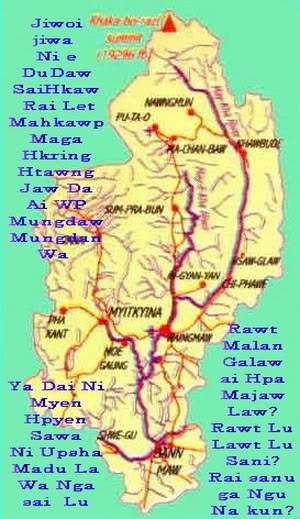By JOSEPH ALLCHIN
Burma’s energy ministry has reported “progress” in tests on a potential new oil field close to Rangoon.
Maubin lies less than 50 kilometres from Burma’s economic hub at a site where natural gas was discovered in 2008. The New Light of Myanmar newspaper said today that energy minister Lun Thi visited the site yesterday afternoon and said that the “region had potential for a new oil field”.
The discovery will provide further encouragement for Burma’s buoyant, yet controversial, oil and gas sector, and follows reports today that Burma is now the world’s 13th largest exporter of natural gas, with 46 contracts in place with foreign companies.
This however contrasts greatly to the CIA World Factbook’s estimation that, as of 2008, Burma was the 22nd largest exporter of natural gas and, as of January 2009, had only the 41st largest proven reserves on earth, with 283.2 billion cubic metres. Its oil reserves are comparatively meagre, and place Burma 77th on an index of proven reserves.
The discrepancy may be due to a projection that when the lucrative Shwe gas pipeline to China comes ‘online’ in 2012, Burma will rise rapidly up the list of gas exporters. This would also apply to onshore blocks such as the potential reserves in northwestern Sagaing division that have interested Korean and Russian investors.
Burma’s gas sector has regularly been dogged by discrepancies, with allegations surfacing that the military government shields gas revenues from the public purse by listing sales at the official exchange rate of six kyat to the dollar, rather than a market rate that hovers around 1,000 kyat to the dollar.
Rights groups, such as EarthRight International, then claim that this money is hidden in Singaporean bank accounts where it is spent exclusively at the whim of the generals.
During Lun Thi’s visit to Maubin yesterday, which included an inspection of the Nyaungdon natural gas compressor, he reportedly called on workers to minimise wastage, perhaps a reference to the biggest environmental disaster in US history as oil spills into the Gulf of Mexico from a burst BP oil well.
This concern is shared by Wong Aung, of the Shwe Gas Movement (SGM), who said that “foreign companies need to integrate policies, have more revenue transparency and have greater control over human rights and environmental policy”.
Korean and Chinese companies are heavily involved in the Shwe pipeline project, which could eventually net the regime around US$30 billion dollars but which campaign groups such as SGM warn could be to the detriment of local populations.
“This kind of industry never creates big employment opportunities, with big, negative impacts on the local community,” Wong Aung said. “The extractive industries are damaging the entire region because they are damaging its financial integrity [due to] undemocratic practices like ‘back-handers’ and corruption.”
Burma’s expansion of its natural gas sector has coincided with rising usage in Asian cities in particular, which are converting vast fleets of public transport vehicles to the fuel. But it only became in vogue recently following the testing environmental concerns that petroleum from crude oil presented – when combusted, natural gas emits less carbon dioxide, a dangerous gas blamed for climate change.
Jul 20, 2010
Subscribe to:
Post Comments (Atom)
WUNPAWNG MUNGDAN SHANGLAWT HPUNG A NINGGAWN MUNGMASA
WUNPAWNG MUNGDAN SHANGLAWT HPUNG A NINGGAWN MUNGMASA
CHYE JU KABA SAI
Sa Du N'Gun Jaw La ai Majaw N'chying wa Chyeju Dum Ga ai,Yawng a Ntsa Wa Karai Kasang Kaw na N'Htum N'Wai ai Shaman Chye ju Tut e Hkam La Lu Nga mu Ga law




No comments:
Post a Comment